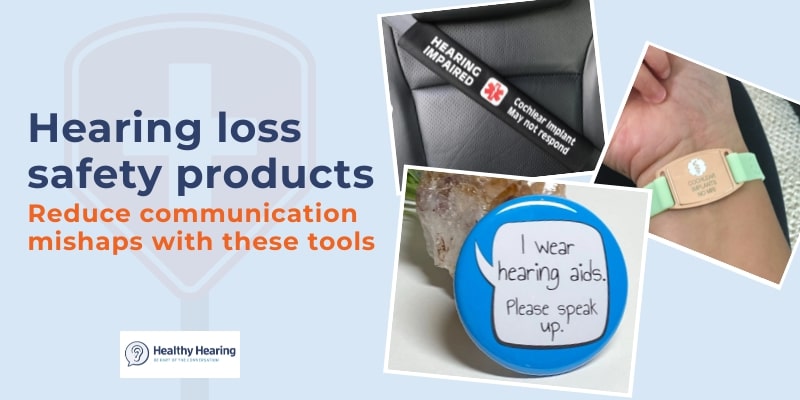|
www.HealthyHearing.com |
Best safety products to tell others you have hearing lossSeatbelt covers, pins and other ideas
Contributed by Jenna Glatzer It’s challenging enough to deal with the social ramifications of hearing loss, but in a stressful situation, it can also be dangerous. In 2019, police tased and kicked a Deaf man when he didn’t respond to their order to put his hands up. In 2022, a hard-of-hearing woman in the Austin airport missed her flight because she couldn’t hear a gate change announcement, then was arrested for trespassing at the wrong gate, then had her arm broken in jail. While these are extreme examples, many situations can become problematic or confusing if you have trouble communicating with strangers. This can range from simple misunderstandings if you don’t hear someone giving you directions or asking you questions to encounters with police and first responders that can go bad quickly. Fortunately, there are products you wear or use to let others know very quickly that you have hearing loss. While no solution is foolproof, these product can help mitigate miscommunication.
Lanyards and pins that indicate hearing impairmentYou can buy or make your own lanyard or pin with a short descriptor on it: “Hard of Hearing. Please speak up,” “Deaf on the left,” or similar phrasing. This helps people who are facing you understand quickly that you have hearing issues. Make sure they words are large and easy to read. There are also products for sale with this information. Where to buy: Hard of hearing pins are available on Etsy. Seatbelt coversJennifer Thoreson, an EMT with the Mayville EMS in Wisconsin, has spent a lot of time thinking about how to best convey communication problems because she has a daughter who’s autistic and nonverbal. In case of emergency, first responders wouldn’t be able to converse with her. She says that while medical ID bracelets for hearing loss and other disabilities are a good idea, they’re not enough in some situations. She advises seatbelt covers in the car as a good solution for those who are hard of hearing, deaf, or nonverbal. “Bracelets and pins are super easy for us to overlook in the heat of the moment in, say, a car crash. We may not see that information right away and it would be really easy to jump to wrong conclusions on treatment needs,” she says. “There are ones that include a pocket that you can even include medication lists and doctor information, or whatever other information you want responders to know.” Where to buy: You can find a variety of seatbelt covers on Etsy, including some you can customize. Temporary (not permanent) car signsWhile it’s smart to have a quick way to identify your hearing loss in a car, retired sergeant Erik Ohland of Suffolk County Police Department in New York suggests that you don’t put a permanent sticker in your window with this information. “If someone is aware that you are hard of hearing or deaf, you may be the target of violence,” he says, noting that people with disabilities can be more vulnerable. In this case, it could alert criminals that they’ll have an easier time breaking into your car or home. He suggests using a sign you can either hide or remove when you’re not in the car, like a placard, or a note on your visor that you can flip up and down as needed. You can also keep a notepad and pen in your glove box so people can communicate with you in writing. When approached by police, don’t reach for anythingRetired Baltimore County, Maryland police officer Ryan Thomas says that first and foremost, when you’re dealing with the police, you need to show you’re not a threat. “Even if you know you're innocent of something, or completely unaware of a situation or why you’re being stopped, the best thing to do is to show your hands if you can't communicate clearly and immediately. You don't want to reach into your pockets or anything that might raise some red flags,” he says. If you’re pulled over in a car, don’t reach for your wallet or anything else until a police officer approaches you first. At that point, you can either tell the officer about your hearing loss or signal it in some way via a sign, seatbelt cover, or other means. Last-minute solutions to avoid communication mishapsIf you’re having trouble understanding someone in a difficult situation, don’t just try to guess. Ask for them to communicate with you however works best for you, whether that means asking someone to speak loudly into your ear, or communicate in writing via texts or caption apps, your phone’s Notes app, a notepad, or whatever scrap of paper is handy. It's good to have an advance plan for different scenarios, for example hearing loss at the nursing home or place of work. You’re not being difficult; you’re just trying to communicate properly. That can help both you and the other party to stay safe and avoid misunderstandings. Healthy Hearing's safety series: In depth
|
Featured clinics near me
Earzlink Hearing Care - Reynoldsburg
7668 Slate Ridge Blvd
Reynoldsburg, OH 43068

Find a clinic
Need a hearing test but not sure which clinic to choose?
Call 1-877-872-7165 for help setting up a hearing test appointment.


